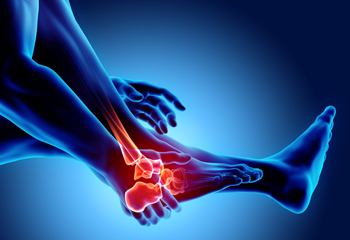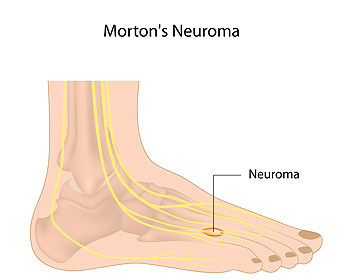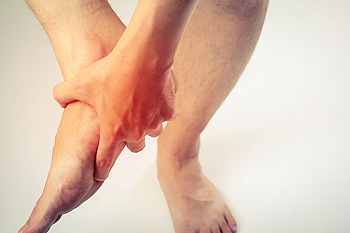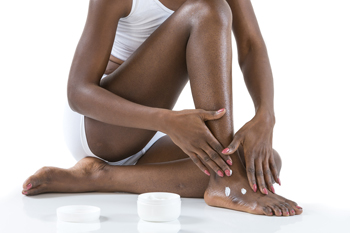Connect With Us
Blog
Items filtered by date: August 2023
Managing Foot Arthritis

Arthritis can affect the joints in the ankles, feet, and toes, leading to symptoms such as pain, swelling, and stiffness. It can also cause changes in the shape of the feet, making it challenging to find appropriate footwear. Some ways to manage foot arthritis include exercise to maintain joint mobility, weight management if necessary to help reduce pressure on the feet, and properly fitted and supportive footwear to protect the feet. There are various medical treatments available to manage arthritis-related foot pain and stiffness. These may include medications, heat and cold therapy, topical creams, and dietary supplements. If you have discomfort from foot arthritis, it is suggested that you make an appointment with a podiatrist for an examination and treatment options to help you get back to comfortable functioning as soon as possible.
Arthritis can be a difficult condition to live with. If you are seeking treatment, contact Dr. Eddy Caldwell from Foot Care of Northeast Arkansas, P.A.. Our doctor can provide the care you need to keep you pain-free and on your feet.
Arthritic Foot Care
Arthritis is a joint disorder that involves the inflammation of different joints in your body, such as those in your feet. Arthritis is often caused by a degenerative joint disease and causes mild to severe pain in all affected areas. In addition to this, swelling and stiffness in the affected joints can also be a common symptom of arthritis.
In many cases, wearing ill-fitting shoes can worsen the effects and pain of arthritis. Wearing shoes that have a lower heel and extra room can help your feet feel more comfortable. In cases of rheumatoid arthritis, the arch in your foot may become problematic. Buying shoes with proper arch support that contour to your feet can help immensely.
Alleviating Arthritic Pain
- Exercises that stretch the foot can prevent further pain and injury and increase mobility
- Most of the pain can be alleviated with anti-inflammatory drugs, heat, and topical medications
- Massages can help temporarily alleviate pain.
It is best to see your doctor for the treatment that is right for your needs and symptoms. Conditions vary, and a podiatrist can help you determine the right method of care for your feet.
If you have any questions, please feel free to contact our office located in Jonesboro, AR . We offer the newest diagnostic tools and technology to treat your foot and ankle needs.
Causes of Morton’s Neuroma

Foot pain can significantly impact one's quality of life, limiting activities like walking, exercising, and even playing with your children. Morton's neuroma is an increasingly common condition that arises from the thickening of nerve tissues in the foot due to extreme compression and irritation. The condition stems from compression of the plantar digital nerves and can lead to permanent damage if not treated promptly. Morton's neuroma most often occurs between the third and fourth toes. Women are more susceptible, possibly due to wearing high-heeled shoes. Improper foot biomechanics, like flat feet or high arches, can also contribute by creating instability around the toe joints. Symptoms of Morton's neuroma include pain, tingling, numbness, and burning sensations, often felt between the toes or in the ball of the foot. Swelling is common, particularly between the toes. Tight, narrow-toed shoes can increase nerve stress and make matters worse. Walking, especially on stairs, can further intensify the pain. Non-surgical interventions include custom orthotic shoe inserts, wearing comfortable shoes with room for the toes, and taking anti-inflammatory medication. Early consultation with a podiatrist is suggested for tailored treatment plans and to avoid surgery.
Morton’s neuroma is a very uncomfortable condition to live with. If you think you have Morton’s neuroma, contact Dr. Eddy Caldwell of Foot Care of Northeast Arkansas, P.A.. Our doctor will attend to all of your foot care needs and answer any of your related questions.
Morton’s Neuroma
Morton's neuroma is a painful foot condition that commonly affects the areas between the second and third or third and fourth toe, although other areas of the foot are also susceptible. Morton’s neuroma is caused by an inflamed nerve in the foot that is being squeezed and aggravated by surrounding bones.
What Increases the Chances of Having Morton’s Neuroma?
- Ill-fitting high heels or shoes that add pressure to the toe or foot
- Jogging, running or any sport that involves constant impact to the foot
- Flat feet, bunions, and any other foot deformities
Morton’s neuroma is a very treatable condition. Orthotics and shoe inserts can often be used to alleviate the pain on the forefront of the feet. In more severe cases, corticosteroids can also be prescribed. In order to figure out the best treatment for your neuroma, it’s recommended to seek the care of a podiatrist who can diagnose your condition and provide different treatment options.
If you have any questions, please feel free to contact our office located in Jonesboro, AR . We offer the newest diagnostic and treatment technologies for all your foot care needs.
Causes and Treatment of Plantar Fasciitis

Plantar fasciitis is the most common cause of heel pain. Its main symptom is inflammation of the plantar fascia, the tissue connecting the front of the foot to the heel. Plantar fasciitis affects approximately 2 million patients each year, with athletes and individuals between 40 to 60 years of age being the most susceptible. The heel pain can range from sharp to dull, often worsening after prolonged periods of standing or physical activity. Causes of plantar fasciitis include repetitive physical activity, foot arch issues, and increased body weight. If left untreated, heel pain can lead to difficulty in walking. Fortunately, plantar fasciitis can be treated with proper care. Stretching exercises can help to rehabilitate the plantar fascia, and wearing proper footwear with adequate arch support is crucial. In some cases, wearing a foot brace or night splint can help to reduce swelling and alleviate pain. A podiatrist may suggest steroid shots or injections, as well as other pain relief medication, and in extreme cases, surgery may be considered. For help with problems associated with plantar fasciitis, it is suggested that you make an appointment with a podiatrist for an exam and treatment options.
Plantar fasciitis is a common foot condition that is often caused by a strain injury. If you are experiencing heel pain or symptoms of plantar fasciitis, contact Dr. Eddy Caldwell from Foot Care of Northeast Arkansas, P.A.. Our doctor can provide the care you need to keep you pain-free and on your feet.
What Is Plantar Fasciitis?
Plantar fasciitis is one of the most common causes of heel pain. The plantar fascia is a ligament that connects your heel to the front of your foot. When this ligament becomes inflamed, plantar fasciitis is the result. If you have plantar fasciitis you will have a stabbing pain that usually occurs with your first steps in the morning. As the day progresses and you walk around more, this pain will start to disappear, but it will return after long periods of standing or sitting.
What Causes Plantar Fasciitis?
- Excessive running
- Having high arches in your feet
- Other foot issues such as flat feet
- Pregnancy (due to the sudden weight gain)
- Being on your feet very often
There are some risk factors that may make you more likely to develop plantar fasciitis compared to others. The condition most commonly affects adults between the ages of 40 and 60. It also tends to affect people who are obese because the extra pounds result in extra stress being placed on the plantar fascia.
Prevention
- Take good care of your feet – Wear shoes that have good arch support and heel cushioning.
- Maintain a healthy weight
- If you are a runner, alternate running with other sports that won’t cause heel pain
There are a variety of treatment options available for plantar fasciitis along with the pain that accompanies it. Additionally, physical therapy is a very important component in the treatment process. It is important that you meet with your podiatrist to determine which treatment option is best for you.
If you have any questions, please feel free to contact our office located in Jonesboro, AR . We offer the newest diagnostic and treatment technologies for all your foot care needs.
We Can Treat Your Foot or Ankle Pain
Understanding Foot and Ankle Changes During Pregnancy

Pregnancy is a journey that brings numerous physical changes, and the feet and ankles are no exception. As the body adapts to accommodate the growing baby, various factors contribute to alterations in the feet and ankles. Many pregnant women develop swollen feet, known as edema, due to increased blood volume and fluid retention. The feet endure extra pressure as weight is gained, potentially causing discomfort and fatigue. Additionally, the hormone that is known as relaxin can loosen the ligaments, causing the feet to temporarily widen or develop into flat feet. The foot structure can become affected, which can cause overpronation. Mild relief may be found when comfortable shoes are worn, preferably those with proper arch support and a wider toe area. Many pregnant women find engaging in a gentle exercise routine beneficial, which can maintain foot health and reduce discomfort. If you would like more information about how pregnancy affects the feet, it is suggested that you confer with a podiatrist.
Pregnant women with swollen feet can be treated with a variety of different methods that are readily available. For more information about other cures for swollen feet during pregnancy, consult with Dr. Eddy Caldwell from Foot Care of Northeast Arkansas, P.A.. Our doctor will attend to all of your foot and ankle needs.
What Foot Problems Can Arise During Pregnancy?
One problem that can occur is overpronation, which occurs when the arch of the foot flattens and tends to roll inward. This can cause pain and discomfort in your heels while you’re walking or even just standing up, trying to support your baby.
Another problem is edema, or swelling in the extremities. This often affects the feet during pregnancy but tends to occur in the later stages.
How Can I Keep My Feet Healthy During Pregnancy?
- Wearing orthotics can provide extra support for the feet and help distribute weight evenly
- Minimize the amount of time spent walking barefoot
- Wear shoes with good arch support
- Wear shoes that allow for good circulation to the feet
- Elevate feet if you experience swelling
- Massage your feet
- Get regular, light exercise, such as walking, to promote blood circulation to the feet
If you have any questions please feel free to contact our office located in Jonesboro, AR . We offer the newest diagnostic and treatment technologies for all your foot and ankle needs.
How to Practice Everyday Foot Care

The feet are often taken for granted, and they are sometimes a part of the body that gets the least respect. The feet are most likely to get injured from absorbing the body’s weight. They are responsible for various things, including providing us with mobility and balance. Many people wear shoes that do not fit correctly, and part of a good everyday foot care routine is to choose shoes that fit well. The day can begin by washing and drying the feet thoroughly, followed by applying a good moisturizer. It is beneficial to alternate pairs of shoes worn each day, and this can provide an opportunity to air the shoes out. Additionally, limiting the time flip-flops are worn can help the arch of the foot. Women who are pregnant may find their feet become swollen, and relief may be found when the feet are frequently elevated. If you would like additional tips on everyday foot care, it is suggested that you consult a podiatrist who can provide you with useful information.
Everyday foot care is very important to prevent infection and other foot ailments. If you need your feet checked, contact Dr. Eddy Caldwell from Foot Care of Northeast Arkansas, P.A.. Our doctor can provide the care you need to keep you pain-free and on your feet.
Everyday Foot Care
Often, people take care of their bodies, face and hair more so than they do for their feet. But the feet are a very important aspect of our bodies, and one that we should pay more attention to. Without our feet, we would not be able to perform most daily tasks.
It is best to check your feet regularly to make sure there are no new bruises or cuts that you may not have noticed before. For dry feet, moisturizer can easily be a remedy and can be applied as often as necessary to the affected areas. Wearing shoes that fit well can also help you maintain good foot health, as well as making it easier to walk and do daily activities without the stress or pain of ill-fitting shoes, high heels, or even flip flops. Wearing clean socks with closed shoes is important to ensure that sweat and bacteria do not accumulate within the shoe. Clean socks help to prevent Athlete’s foot, fungi problems, bad odors, and can absorb sweat.
If you have any questions please feel free to contact our office located in Jonesboro, AR . We offer the newest diagnostic and treatment technologies for all your foot and ankle needs.






